Cloud Enterprise Network (CEN) helps you build a high-quality network environment. CEN provides a simplified networking method to build a hybrid cloud with a scale and communication capability at the enterprise level. This topic describes how to combine Express Connect circuits, virtual private network (VPN) gateways, and Smart Access Gateway (SAG) instances to build a hybrid cloud.
Network topology
- Data centers in the China (Beijing), China (Shanghai), China (Hangzhou), and China (Guangzhou) regions are deployed by an enterprise.
- In addition, the enterprise created virtual private clouds (VPCs) in the China (Beijing), China (Shanghai), China (Hangzhou), and China (Shenzhen) regions.
- The data centers in the China (Beijing) and China (Shanghai) regions are connected to Alibaba Cloud by using Express Connect circuits. The virtual border routers (VBRs) of the Express Connect circuits are attached to a CEN instance.
- The data center in the China (Hangzhou) region is connected to the VPC in the China (Hangzhou) region by using a VPN gateway.
- The data center in the China (Guangzhou) region is connected to Alibaba Cloud by using an SAG instance. The Cloud Connect Network (CCN) instance to which the SAG instance belongs is attached to the CEN instance.
- The VPCs of the enterprise in the China (Beijing), China (Shanghai), China (Shenzhen), and China (Hangzhou) regions are attached to the CEN instance.
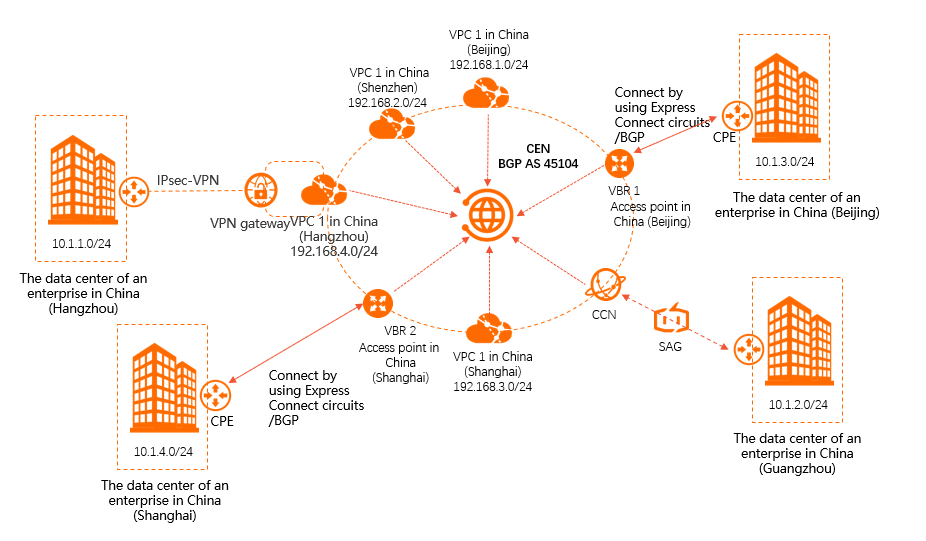
Subnetting
| Network | CIDR block |
| Data center in China (Hangzhou) | 10.1.1.0/24 |
| Data center in China (Guangzhou) | 10.1.2.0/24 |
| Data center in China (Beijing) | 10.1.3.0/24 |
| Data center in China (Shanghai) | 10.1.4.0/24 |
| VPC in China (Beijing) | 192.168.1.0/24 |
| VPC in China (Shenzhen) | 192.168.2.0/24 |
| VPC in China (Shanghai) | 192.168.3.0/24 |
| VPC in China (Hangzhou) | 192.168.4.0/24 |
Methods that are used to connect data centers to Alibaba Cloud
- Connect the data centers in the China (Beijing) and China (Shanghai) regions to Alibaba Cloud by using Express Connect circuits
- Connect the data center in the China (Hangzhou) region to Alibaba Cloud by using a VPN gateway
- Connect the data center in the China (Guangzhou) region to Alibaba Cloud by using an SAG instance
Connect the data centers in the China (Beijing) and China (Shanghai) regions to Alibaba Cloud by using Express Connect circuits
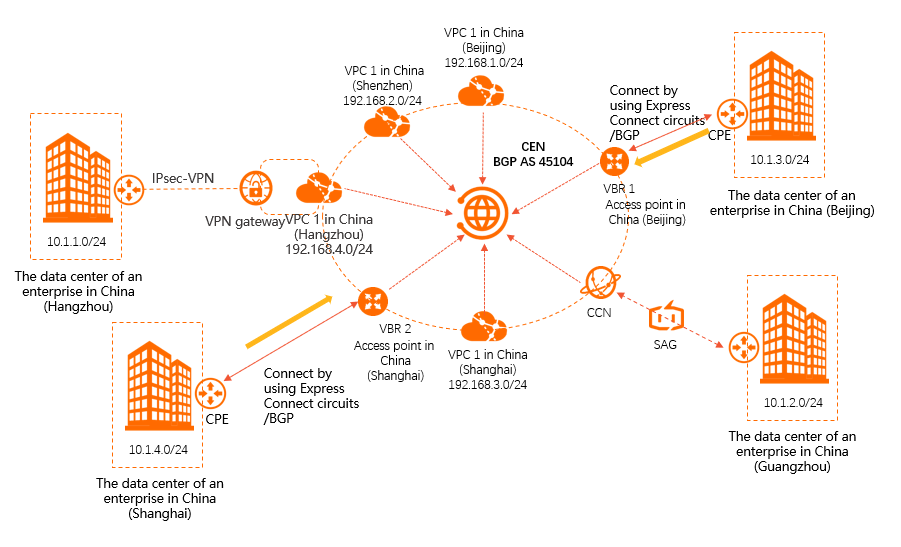
Procedure:
- Connect the data centers in the China (Beijing) and China (Shanghai) regions to VBRs by using Express Connect circuits. Then, configure the data centers and the connected VBRs as Border Gateway Protocol (BGP) peers. For more information, see Configure BGP.
- Use the customer-premises equipment (CPE) of the data centers in the China (Beijing) and China (Shanghai) regions to advertise the CIDR blocks of the data centers to the CEN instance by using BGP. The following table describes the configurations of the CPE in the China (Beijing) and China (Shanghai) regions.
Parameter CPE in China (Beijing) CPE in China (Shanghai) Local BGP ASN A B Peer BGP ASN 45104 45104 Network 10.1.3.0/24 10.1.4.0/24 After the data centers and the VBRs are configured as BGP peers, the data centers and the VBRs can learn routes from each other.
Connect the data center in the China (Hangzhou) region to Alibaba Cloud by using a VPN gateway
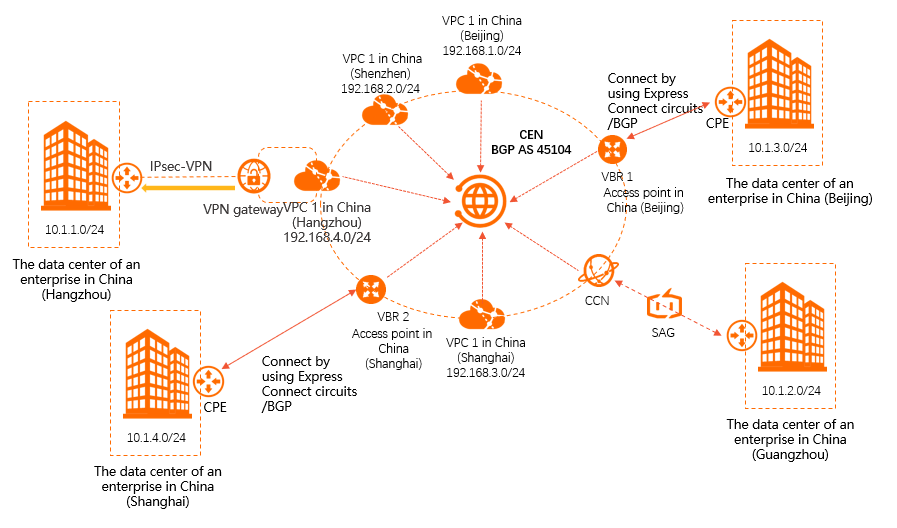
Procedure:
- Create an IPsec-VPN connection to connect the data center in the China (Hangzhou) region to the VPC in the China (Hangzhou) region. For more information, see Connect a VPC to a data center in single-tunnel mode.
- Configure a specific route or default route that points to Alibaba Cloud. Configure a specific route:
Destination CIDR block Next hop 10.1.2.0/24 VPN gateway 10.1.3.0/24 VPN gateway 10.1.4.0/24 VPN gateway 192.168.1.0/24 VPN gateway 192.168.2.0/24 VPN gateway 192.168.3.0/24 VPN gateway 192.168.4.0/24 VPN gateway Configure a default route:Destination CIDR block Next hop 0.0.0.0/0 VPN gateway - To allow the data centers to communicate with the network instances that are attached to the CEN instance, you must add a route to the VPC that is associated with the VPN gateway and advertise the route to the CEN instance. The route must point to the data center.

Configure the route based on the following information:
- Add a route to the route table of the VPC in the China (Hangzhou) region. The destination CIDR block is set to 10.1.1.0/24 and the next hop is set to the VPN gateway that is created for the VPC.
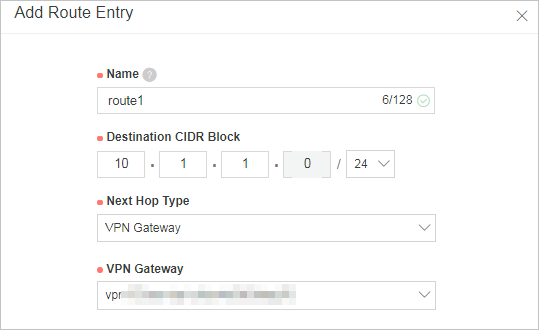
- Advertise the route from the VPC in the China (Hangzhou) region to the CEN instance.
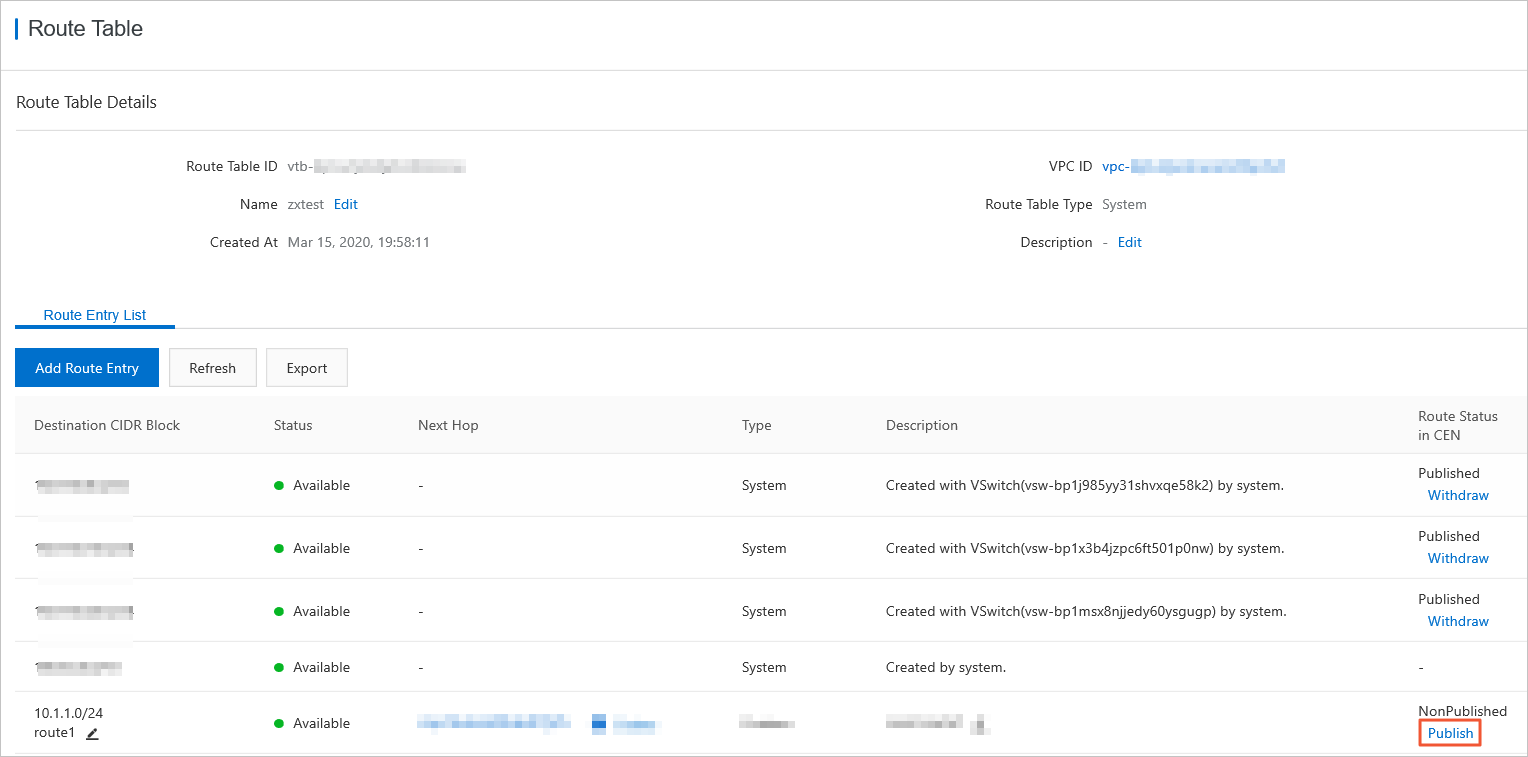
After you advertise the route to the CEN instance, the network instances that are attached to the CEN instance can learn the route. This way, the data centers in the China (Hangzhou) region can communicate with all network instances that are attached to the CEN instance.
- Add a route to the route table of the VPC in the China (Hangzhou) region. The destination CIDR block is set to 10.1.1.0/24 and the next hop is set to the VPN gateway that is created for the VPC.
Connect the data center in the China (Guangzhou) region to Alibaba Cloud by using an SAG instance
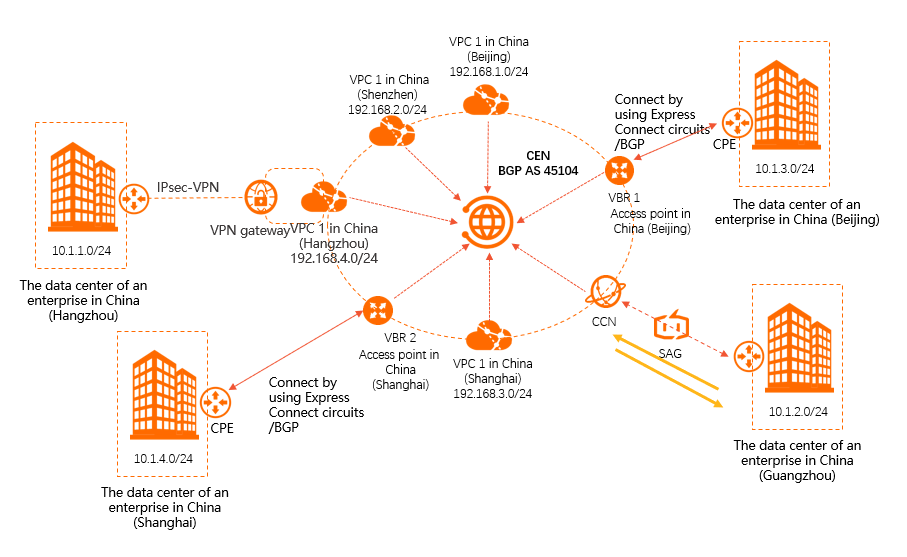
Procedure:
- Log on to the SAG console, select an SAG instance to connect to the data center in the China (Guangzhou) region, and then configure a route for the connection. For more information, see Advertise routes to Alibaba Cloud.

- Attach the CCN instance that is associated with the SAG instance to the CEN instance. This way, the data center in the China (Guangzhou) region can communicate with the network instances that are attached to the CEN instance. For more information, see Associate a CCN instance with a CEN instance.
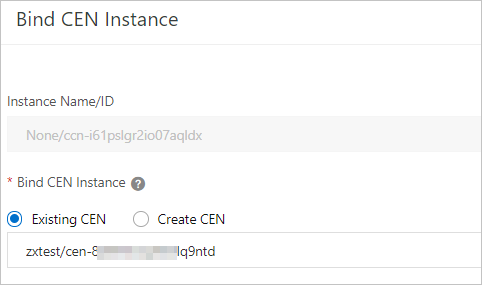
Connect the data centers in all regions
- The data centers in the China (Beijing) and China (Shanghai) regions are connected to Alibaba Cloud by using Express Connect circuits over BGP. Therefore, attach the VBRs to the CEN instance.
- The data center in the China (Hangzhou) region is connected to Alibaba Cloud by using a VPN gateway. Therefore, attach the VPC for which the VPN gateway is created to the CEN instance.
- The data center in the China (Guangzhou) region is connected to Alibaba Cloud by using an SAG instance. Therefore, attach the CCN instance that is associated with the SAG instance to the CEN instance.
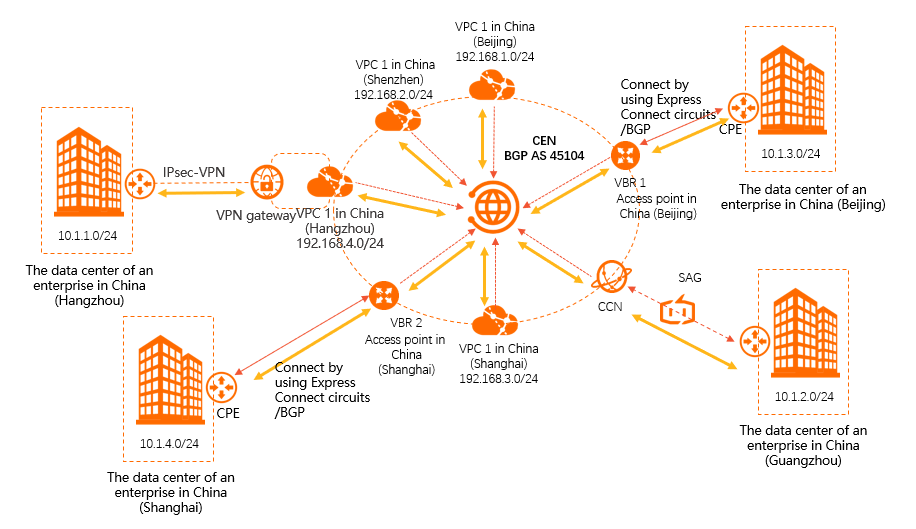
| Destination CIDR block | Next hop | Route type |
| 10.1.1.0/24 | BGP peer: VBR in China (Beijing) | BGP route |
| 10.1.2.0/24 | BGP peer: VBR in China (Beijing) | BGP route |
| 10.1.4.0/24 | BGP peer: VBR in China (Beijing) | BGP route |
| 192.168.1.0/24 | BGP peer: VBR in China (Beijing) | BGP route |
| 192.168.2.0/24 | BGP peer: VBR in China (Beijing) | BGP route |
| 192.168.3.0/24 | BGP peer: VBR in China (Beijing) | BGP route |
| 192.168.4.0/24 | BGP peer: VBR in China (Beijing) | BGP route |
| Destination CIDR block | Next hop | Route type |
| 10.1.3.0/24 | BGP peer: CPE in China (Beijing) | BGP route |
| 10.1.1.0/24 | VPC in China (Hangzhou) | CEN route |
| 10.1.2.0/24 | CCN | CEN route |
| 10.1.4.0/24 | VBR in China (Shanghai) | CEN route |
| 192.168.1.0/24 | VPC in China (Beijing) | CEN route |
| 192.168.2.0/24 | VPC in China (Shenzhen) | CEN route |
| 192.168.3.0/24 | VPC in China (Shanghai) | CEN route |
| 192.168.4.0/24 | VPC in China (Hangzhou) | CEN route |
| Destination CIDR block | Next hop | Route type |
| 10.1.1.0/24 | VPC in China (Hangzhou) | CEN route |
| 10.1.2.0/24 | CCN | CEN route |
| 10.1.3.0/24 | VBR in China (Beijing) | CEN route |
| 10.1.4.0/24 | VBR in China (Shanghai) | CEN route |
| 192.168.1.0/24 | VPC in China (Beijing) | CEN route |
| 192.168.3.0/24 | VPC in China (Shanghai) | CEN route |
| 192.168.4.0/24 | VPC in China (Hangzhou) | CEN route |